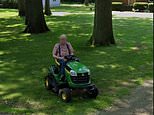As a young female TV crew member working in an industry where 50% of freelancers are currently unemployed, Amelie* was desperate for a job and money to pay her bills. So when she was offered work on a TV film for a major UK broadcaster miles from where she lived, she took it – despite the fact no accommodation was provided. The set location was in Essex, two and a half to three hours’ drive away from home. Her commute entailed driving around the M25 to and from each day’s shooting, which could take six hours a day during rush hour, and doing the journey even when filming finished at 5.30am. So it was no surprise to those who knew her that, after a couple of weeks, she fell asleep at the wheel of her car and crashed.
It also came as no shock to many who work within the multibillion-pound UK television industry. Car accidents caused by tired, overstretched crew nodding off happen frequently and are often unreported, as workers fear raising the issue could cost them their jobs. Exhaustion is also leading to burnout and accidents on set, with one source alleging a Netflix production recorded almost 50 incidents.
In May, this worrying situation was highlighted by the death in the US of Rico Priem – a crew member on emergency services drama 9-1-1, who died driving home after suffering a heart attack following two consecutive 14-hour overnight shifts. There are now concerns that it is only a matter of time before a similar tragedy occurs in Britain.
Despite its glamorous image, the television industry is renowned for its long working hours, and experienced workers say the situation has worsened due to an advertising downturn, fewer TV shows being commissioned, budget cuts and inflation. The industry is also going through a period of structural change, with the streamers trying to become more profitable and the traditional British broadcasters commissioning fewer of the smaller shows that used to fill TV channels during the daytime, as viewing habits move to online rivals. With the business model in flux, the UK independent TV production sector suffered a £400m fall in revenues to £3.61bn last year. Broadcasters are cutting spending and some production companies are struggling to survive or closing.
Many working in the industry are fearful of reprisals, but some have spoken to the Guardian anonymously as they are worried about crew members’ wellbeing – particularly following the tragic death of crime producer John Balson, who died by suicide this year after developing an illness he thought was either caused or exacerbated by overwork.
Insiders revealed that “unrealistic budgets” combined with “huge expectations” on how a show will look, plus last-minute creative decisions being made by “detached” executives in offices miles away (which those on the ground have to turn into reality), are creating an exhausted workforce, with some choosing to leave the industry as it has damaged their health.
One experienced crew member says that safety has been “an ongoing issue … for a while”, adding: “I fell asleep driving around London – I drove into the back of another vehicle. I know lots of people who’ve done the same thing. No amount of coffee is going to help. Your body is saying ‘no’ … [but] you don’t know until you’ve fallen asleep.
“I know people who have woken up just before they’ve hit the central reservation. Everybody knows of someone who’s crashed. The danger element is real.”
Fortunately, Amelie survived her accident. A friend of hers says: “I was so upset for her but she just took it in her stride and said, ‘What can I do?’ She has an insurance claim so will lose her no-claims bonus and the premium will go up.”
The friend added that the production company that employed Amelie had provided health and safety courses on set for staff, “but they need to put more in there about the travelling” to and from filming and not just “tick that box” of people completing courses. “We’ve got to try to do something because it’s shocking. Rico Priem died. Is the industry going to [wait until] somebody else dies to do something?”
The national secretary of UK broadcast workers’ union Bectu, Spencer MacDonald, says the industry needs to “wake up to the situation” and face the fact that “all the time there are accidents happening” after long shoots. However, he says, “most of the time they go unreported” because they happen off set, and “because people are freelance, so they’re concerned about their reputation”. Many workers don’t want to be seen to be saying that the accidents happened as “a result of the hours they have been working”.
The freelance nature of the industry also exacerbates the issue in that many TV shows are made not by broadcasters themselves but by separate, independent production companies. Rules and collective agreements with unions are in place as to how TV shows are made and how much time crews should have off between shifts. But the theory is not always put into practice: many series are shot on multiple locations and crews are not always put up in hotels by the production, meaning some may have long drives home after filming.
As one head of department (HoD) explains, there is a “structural issue” around hotel accommodation for junior crew members. “When the production office is London-based, no one would normally get overnight accommodation if they’re travelling from somewhere like the Midlands or Yorkshire, because they [the production office] expect everyone to live in London.” While senior workers who live far from the English capital can afford to pay for their own hotel in London, many less-established staff members cannot, so they commute.
The HoD goes on: “If you’re important to them on the production, they’ll bend over backwards and give you what you want. If you’re a runner or a second or third assistant director, or lower, they sometimes see you as one of the minions and you don’t matter. That’s appalling, because for me everybody is as important as the next person.”
Power imbalances are also a factor. If the production’s first assistant director [essentially the director’s right-hand person] pushes to get all their team accommodation “and ends up costing the producer money that they didn’t budget for, they might not use them again on their next production,” the HoD notes.
Car crashes on the way home from filming are a grey area: though the driver’s tiredness may have been caused by their shift pattern, such incidents happen outside working hours so do not have to be reported to producers. However, the exhaustion some crew are experiencing can also lead to accidents on set, which are recorded. One insider said they worked on a series for Netflix which involved shooting in mountainous areas and switching between night and day work. Approximately 48 accident reports were filed. The source explains: “People can’t switch from night work to day work just like that. We know a lot about the effect of lack of sleep. People are just getting stretched so far these days.” They say the production was not “doing anything that wasn’t by the book” but that producers should look at working practices.
Netflix points out that it has a production health and safety team for each show, plus a confidential hotline, and it has worked with safety experts to establish its Netflix Lifesavers protocol to ensure safer sets. A spokesperson says: “We have a tool pack for people on set, 24-hour hotlines and take health and safety very seriously.”
However, the insider says: “Someone would have had a budget in mind but it often does not work in reality. What we see more and more of is unrealistic budgets and executives who are detached from [what’s happening] on the ground and making decisions last minute. There is turmoil, pressure and huge expectations.”
They add: “It was always tough, but it’s progressively got worse. It really does come from the top … then pressure is put on us to make up for the fact [that decisions] are not properly thought out and planned. We’re expected to make it work.”
MacDonald of Bectu says that with more shows being made for US streamers and studios, the culture has evolved as they have a “different mindset”. “Over there, they have shorter turnaround times – the time between when they finish and then they start again … The culture in America is kind of ‘capture as much as they can within the time that they’ve got’.”
Looking after crew members’ wellbeing benefits the industry long-term as it is more expensive to retrain than retain staff, MacDonald explains. He believes change is possible, pointing to the success of shorter working days in Nordic countries. Bectu has also negotiated better hours for set construction staff (eg carpenters) which resulted in higher productivity and less churn, “because they’re not burnt out and they don’t get so many mental health issues”.
According to the Film and TV Charity’s 2022 survey, only 11% of respondents thought “the industry is a mentally healthy place to work” and 83% said that “industry culture has a negative effect on their wellbeing”. One professional I speak with (who has a stress-related illness) says the industry often takes advantage of the fact that many people see their career as a vocation, so go the extra mile at the expense of their wellbeing. They also say autoimmune diseases are on the rise. Cambridge University and autoimmune charity the Wren Project recently co-authored research into the issue and Wren’s founder, Kate Middleton, confirmed there is a “strong correlation between stress and autoimmune disease and the interaction of physical and mental health”.
The Mark Milsome Foundation – created following the death of a cameraman while filming a night-time car stunt for BBC/Netflix drama Black Earth Rising – runs courses about set health and safety and is lobbying for education about the issue to be mandatory. Its chair, Samantha Wainstein, tells the Guardian that the current difficult employment climate makes people even more nervous to speak out. “That’s potentially why we’re seeing a number of incidents in the last few months.” Sometimes people are “asked to opt out [of agreements] … and say that you will work the hours as required”.
Wainstein says the foundation wants the 1974 Health and Safety at Work Act to be reviewed as it is out of date with the way people work in the freelance and gig economy. “People need to feel that they can speak up. A number of studios and productions are trying hard to make a difference. That’s fantastic – but a bigger cultural shift is needed.”
One solution suggested by many is each show having an anonymous exit survey. As one source says: “Everyone’s frightened of losing their job so they don’t want to put their names to the complaints.
“Productions do mostly try to do the right thing in terms of checklists etc but those things are not always implemented.”
John McVay, CEO of the producers’ alliance Pact, says his members care about crew and want to hear about issues. “Anyone being harmed, or [in an accident] is absolutely terrible.” He says HoDs should raise issues “if they’re concerned about something and give the production an opportunity to do something about it”.
A new watchdog, the Creative Industries Independent Standards Authority, is being set up to provide a safer environment for workers in TV, film, music and theatre, but is not due to launch until next year. The BBC and ITV declined to comment as individual programmes have not been named.
As Wainstein puts it: “Working in TV is incredibly exciting and incredibly collegiate. It has wonderful things about it, but it’s not wonderful enough to give up your life for. It’s just not.”
* Name changed to protect identity
Do you have an opinion on the issues raised in this article? If you would like to submit a response of up to 300 words by email to be considered for publication in our letters section, please click here.










